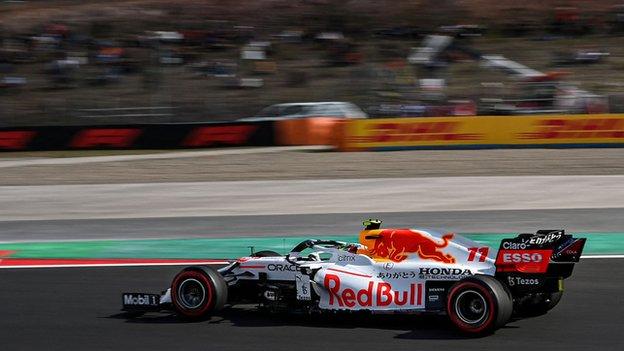Turkish Grand Prix: Lewis Hamilton takes engine penalty
- Published

The Turkish Grand Prix is live on 5 Live and the BBC Sport website
Lewis Hamilton will have a 10-place grid penalty at Sunday's Turkish Grand Prix but topped both Friday sessions at Istanbul Park.
Mercedes have taken a fourth engine - one more than is permitted - to reduce the risks of him suffering a failure during the tight championship run-in.
But he has taken only one power-unit component - the internal combustion engine - so escapes a full grid drop.
The aim is to lose as little ground to title rival Max Verstappen as possible.
The Red Bull driver trails Hamilton by two points in the championship after recovering from the back of the grid following his own engine penalty to finish second behind the seven-time champion in Russia at the last race.
Hamilton topped first practice at Istanbul Park, 0.425 seconds ahead of Verstappen, and also headed the time sheets in the second session, in which Ferrari's Charles Leclerc was second, 0.166secs behind the Mercedes.
Hamilton said the car had felt better in the first session than the second but was confident Mercedes could improve it overnight.
"I need to be on pole to limit the loss [from the penalty]," he said.
Verstappen was 0.635secs off the pace in the second session, in which the understeer he was suffering in the first session had been replaced by oversteer.
He said: "Great track, but today was challenging. It looks like we have some work to do overnight to improve our performance."
Leclerc, who was third fastest in the first session, looked competitive all day in the Ferrari, which is fitted with an engine with the upgraded hybrid system to which he gave a debut in the last race in Russia.
Mercedes have made the decision to change Hamilton's engine for reliability and performance reasons, after the seven-time champion lost one of his three engines with a failure in practice at the Dutch Grand Prix last month.
Taking the fourth internal combustion engine gives them a bit more peace of mind, as well as overall performance, for the championship run-in.
The team based their decision on simulations of the races to come, trying to balance the negative impact of a penalty with the risk of reliability issues.
It was influenced by the fact that a grid penalty such as this is far less damaging than a failure in a race and a penalty at a subsequent one as a result.
Mercedes said they required only a change of internal combustion engine, and not that of any of the other components: the turbo, hybrid system, battery and electronics.
Ferrari driver Carlos Sainz had already been confirmed as having a full engine change and he will start from the back of the grid.
In the second session, Hamilton's team-mate Valtteri Bottas was third fastest, ahead of the Red Bull's of Sergio Perez and Verstappen, McLaren's Lando Norris and the Alpines of Fernando Alonso and Esteban Ocon.

Ridley Road: Caught between life and death in the swinging sixties
The Nuremberg Trials: The remarkable aftermath of the verdict on Nazi War Criminals
